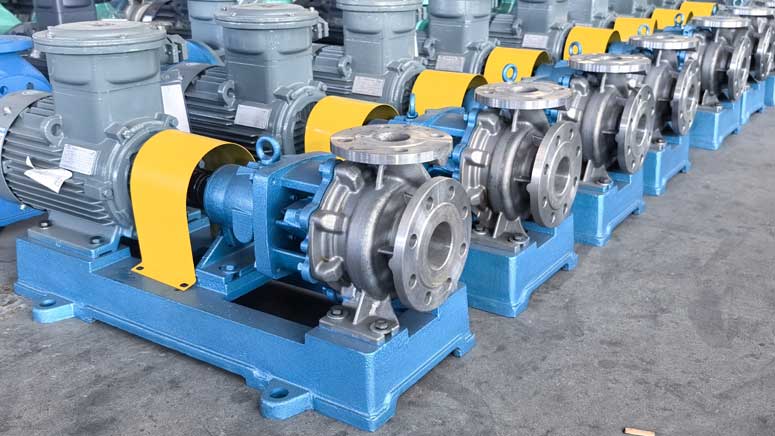Stainless steel corrosion-resistant centrifugal pumps are widely used in chemical, pharmaceutical, food processing, and water treatment industries, particularly for transporting various corrosive media. Choosing the right material not only ensures the pump's corrosion resistance but also improves its service life and operational efficiency. This article will provide a detailed introduction to the material selection for stainless steel corrosion-resistant centrifugal pumps and how it affects the pump's performance, helping users better understand and apply this technology.
Ⅰ.Common Materials for Stainless Steel Corrosion-Resistant Centrifugal Pumps
1.304 Stainless Steel
Characteristics:304 stainless steel is an austenitic stainless steel containing chromium and nickel, offering good corrosion resistance and mechanical strength. It is suitable for handling general acids, alkalis, and salt solutions.
Applications:Ideal for food processing, drinking water treatment, pharmaceuticals, and light chemical industries. 304 stainless steel is an economical choice for non-oxidizing or mildly corrosive media.
2.316 Stainless Steel
Characteristics:316 stainless steel contains molybdenum, in addition to chromium and nickel, which enhances its corrosion resistance, especially in chloride-containing environments.
Applications:Suitable for chemical, marine engineering, pharmaceuticals, and petrochemical industries. 316 stainless steel is ideal for applications involving saltwater or chloride-rich media due to its higher resistance to chloride corrosion.

3.316L Stainless Steel
Characteristics:316L stainless steel is a low-carbon version of 316 stainless steel, offering better weldability and corrosion resistance, especially in applications where post-weld heat treatment is not feasible.
Applications:Widely used in the chemical and pharmaceutical industries, particularly where high corrosion resistance at weld joints is required. 316L stainless steel is suitable for transporting highly corrosive media, such as acidic and alkaline solutions.
4.2205 Duplex Stainless Steel
Characteristics:2205 duplex stainless steel combines the properties of austenitic and ferritic stainless steels, providing high strength and excellent corrosion resistance, especially against stress corrosion cracking.
Applications:Ideal for petrochemical, marine engineering, and pulp and paper industries. 2205 duplex stainless steel excels in chloride and sulfuric acid environments due to its superior corrosion resistance.
5.904L Stainless Steel
Characteristics:904L stainless steel is a high-alloy austenitic stainless steel with excellent corrosion resistance, particularly in strong acidic media.
Applications:Mainly used in chemical, marine engineering, and pharmaceutical industries, especially for transporting sulfuric acid, phosphoric acid, and other highly acidic media. 904L stainless steel is suitable for extreme corrosive environments, ensuring long-term stable operation.
Ⅱ.Impact of Material Selection on Pump Performance
1.Corrosion Resistance
Different stainless steel materials have varying levels of corrosion resistance. Choosing the right material can effectively resist media corrosion, extend the pump's service life, and reduce maintenance costs.
2.Mechanical Strength
The mechanical strength of the pump is closely related to the material. High-strength stainless steel materials can withstand higher operating pressures, reduce vibration and noise, and improve operational stability.
3.Economic Efficiency
The cost of different stainless steel materials varies. Users should choose the appropriate material based on the corrosiveness of the media, the operating environment, and budget to achieve the best balance between economy and performance.
4.Weldability
For pump components that require welding, the material's weldability is crucial. Low-carbon stainless steel (such as 316L) does not produce intergranular corrosion after welding, making it an ideal choice for welding applications.
The material selection for stainless steel corrosion-resistant centrifugal pumps has a significant impact on their performance and service life. Users should consider the media characteristics, working environment, and economic factors comprehensively to determine the most suitable material. Tenglong Pump & Valve is committed to providing high-quality stainless steel corrosion-resistant centrifugal pumps to meet the needs of various industries, supporting efficient and safe industrial production.





 +86 18130251359
+86 18130251359 teflowpumps@tlpumps.com
teflowpumps@tlpumps.com








 +86+0563-5093318
+86+0563-5093318
